Food Service Management: Strategies & Practices - HND Hospitality
VerifiedAdded on 2023/06/18
|17
|5036
|474
Report
AI Summary
This report provides a comprehensive analysis of food service management within the hospitality sector, focusing on 'The Elephant' restaurant as a case study. It discusses various food supply chain approaches, including direct and outsourced models, and identifies key stakeholders such as farmers, processors, transportation, and customers. The report elaborates on the principles of procurement and sourcing processes, highlighting stages like supplier selection, purchase requisition, and market assessment. Analytical tools such as SWOT and PESTLE are applied to evaluate the restaurant's strengths, weaknesses, opportunities, and threats, as well as external political, economic, social, and technological factors. The report also examines ethical practices, management practices, and performance review techniques, concluding with recommendations for improvement and an implementation plan. The aim is to optimize business operations and enhance the overall success of the food service organization, with Desklib offering additional resources for students.
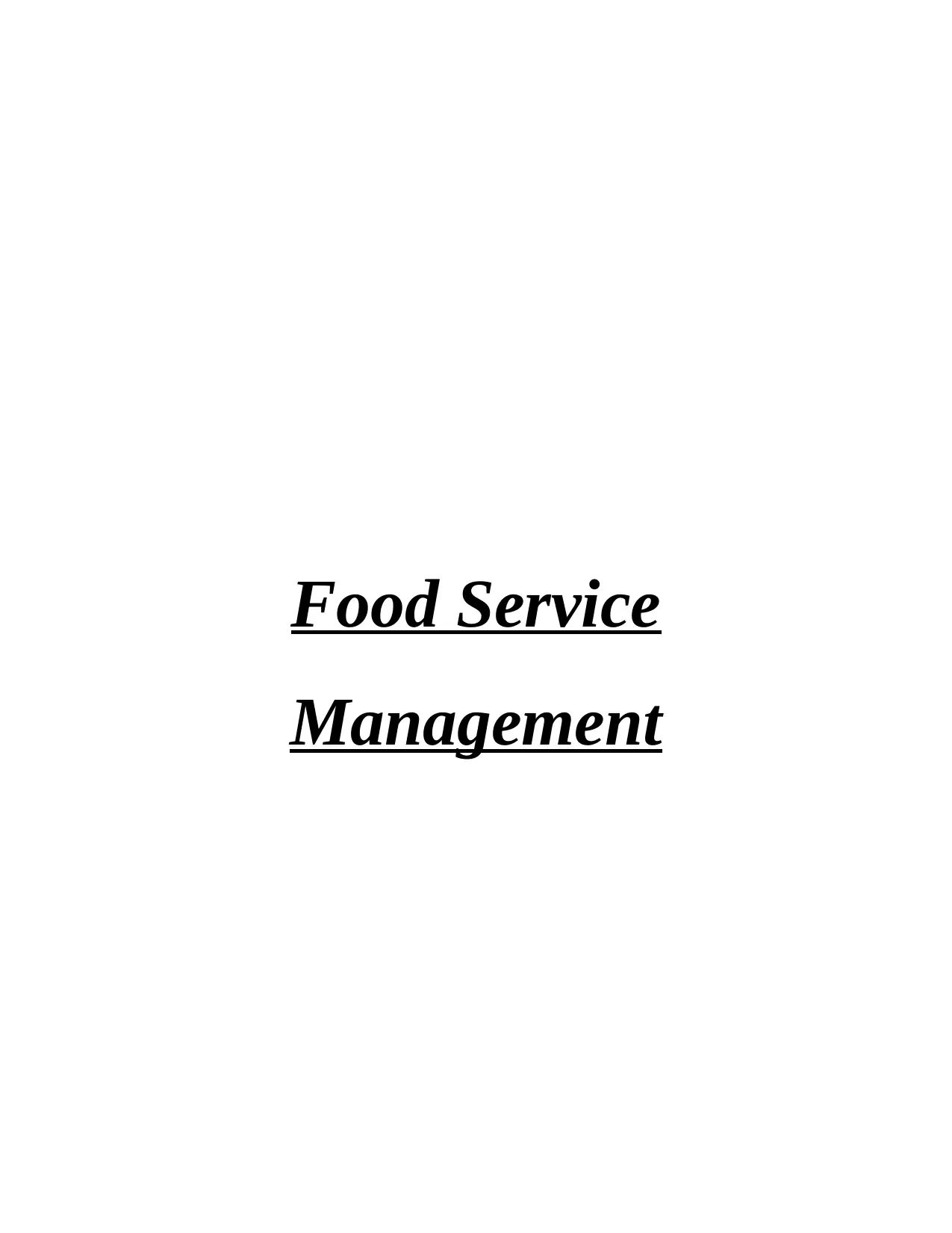
Food Service
Management
Management
Paraphrase This Document
Need a fresh take? Get an instant paraphrase of this document with our AI Paraphraser
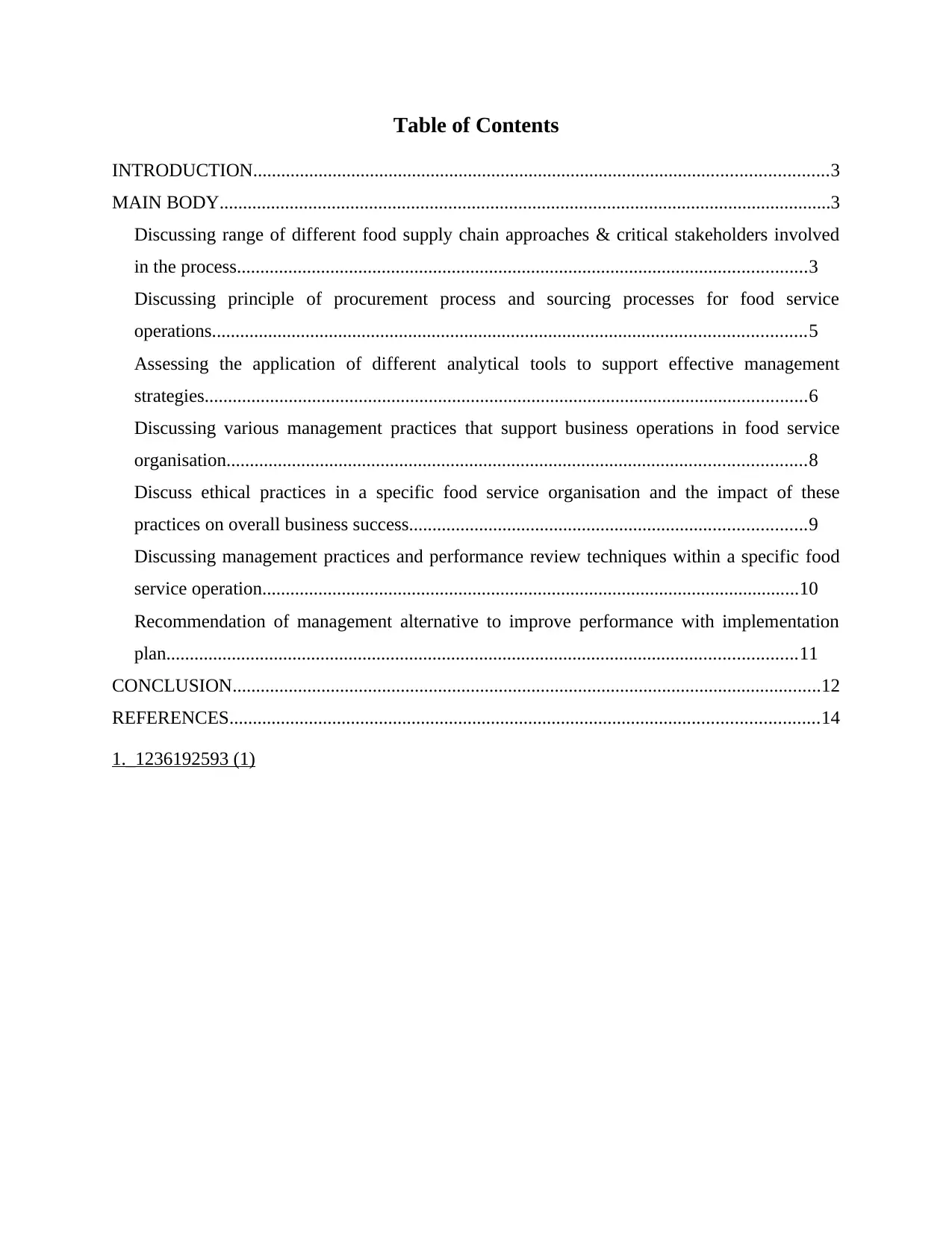
Table of Contents
INTRODUCTION...........................................................................................................................3
MAIN BODY...................................................................................................................................3
Discussing range of different food supply chain approaches & critical stakeholders involved
in the process..........................................................................................................................3
Discussing principle of procurement process and sourcing processes for food service
operations...............................................................................................................................5
Assessing the application of different analytical tools to support effective management
strategies.................................................................................................................................6
Discussing various management practices that support business operations in food service
organisation............................................................................................................................8
Discuss ethical practices in a specific food service organisation and the impact of these
practices on overall business success.....................................................................................9
Discussing management practices and performance review techniques within a specific food
service operation...................................................................................................................10
Recommendation of management alternative to improve performance with implementation
plan.......................................................................................................................................11
CONCLUSION..............................................................................................................................12
REFERENCES..............................................................................................................................14
1._1236192593 (1)
INTRODUCTION...........................................................................................................................3
MAIN BODY...................................................................................................................................3
Discussing range of different food supply chain approaches & critical stakeholders involved
in the process..........................................................................................................................3
Discussing principle of procurement process and sourcing processes for food service
operations...............................................................................................................................5
Assessing the application of different analytical tools to support effective management
strategies.................................................................................................................................6
Discussing various management practices that support business operations in food service
organisation............................................................................................................................8
Discuss ethical practices in a specific food service organisation and the impact of these
practices on overall business success.....................................................................................9
Discussing management practices and performance review techniques within a specific food
service operation...................................................................................................................10
Recommendation of management alternative to improve performance with implementation
plan.......................................................................................................................................11
CONCLUSION..............................................................................................................................12
REFERENCES..............................................................................................................................14
1._1236192593 (1)
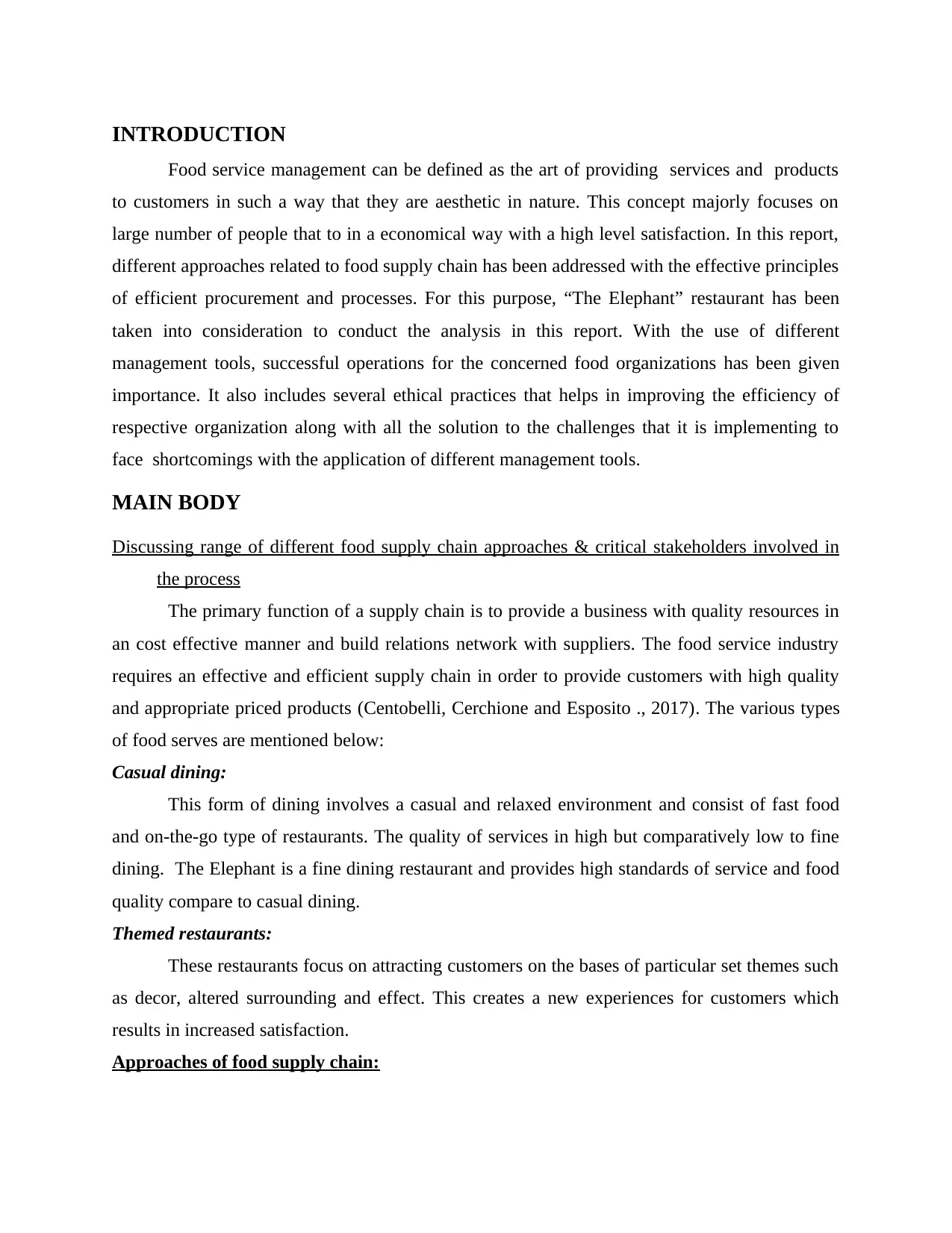
INTRODUCTION
Food service management can be defined as the art of providing services and products
to customers in such a way that they are aesthetic in nature. This concept majorly focuses on
large number of people that to in a economical way with a high level satisfaction. In this report,
different approaches related to food supply chain has been addressed with the effective principles
of efficient procurement and processes. For this purpose, “The Elephant” restaurant has been
taken into consideration to conduct the analysis in this report. With the use of different
management tools, successful operations for the concerned food organizations has been given
importance. It also includes several ethical practices that helps in improving the efficiency of
respective organization along with all the solution to the challenges that it is implementing to
face shortcomings with the application of different management tools.
MAIN BODY
Discussing range of different food supply chain approaches & critical stakeholders involved in
the process
The primary function of a supply chain is to provide a business with quality resources in
an cost effective manner and build relations network with suppliers. The food service industry
requires an effective and efficient supply chain in order to provide customers with high quality
and appropriate priced products (Centobelli, Cerchione and Esposito ., 2017). The various types
of food serves are mentioned below:
Casual dining:
This form of dining involves a casual and relaxed environment and consist of fast food
and on-the-go type of restaurants. The quality of services in high but comparatively low to fine
dining. The Elephant is a fine dining restaurant and provides high standards of service and food
quality compare to casual dining.
Themed restaurants:
These restaurants focus on attracting customers on the bases of particular set themes such
as decor, altered surrounding and effect. This creates a new experiences for customers which
results in increased satisfaction.
Approaches of food supply chain:
Food service management can be defined as the art of providing services and products
to customers in such a way that they are aesthetic in nature. This concept majorly focuses on
large number of people that to in a economical way with a high level satisfaction. In this report,
different approaches related to food supply chain has been addressed with the effective principles
of efficient procurement and processes. For this purpose, “The Elephant” restaurant has been
taken into consideration to conduct the analysis in this report. With the use of different
management tools, successful operations for the concerned food organizations has been given
importance. It also includes several ethical practices that helps in improving the efficiency of
respective organization along with all the solution to the challenges that it is implementing to
face shortcomings with the application of different management tools.
MAIN BODY
Discussing range of different food supply chain approaches & critical stakeholders involved in
the process
The primary function of a supply chain is to provide a business with quality resources in
an cost effective manner and build relations network with suppliers. The food service industry
requires an effective and efficient supply chain in order to provide customers with high quality
and appropriate priced products (Centobelli, Cerchione and Esposito ., 2017). The various types
of food serves are mentioned below:
Casual dining:
This form of dining involves a casual and relaxed environment and consist of fast food
and on-the-go type of restaurants. The quality of services in high but comparatively low to fine
dining. The Elephant is a fine dining restaurant and provides high standards of service and food
quality compare to casual dining.
Themed restaurants:
These restaurants focus on attracting customers on the bases of particular set themes such
as decor, altered surrounding and effect. This creates a new experiences for customers which
results in increased satisfaction.
Approaches of food supply chain:
⊘ This is a preview!⊘
Do you want full access?
Subscribe today to unlock all pages.

Trusted by 1+ million students worldwide
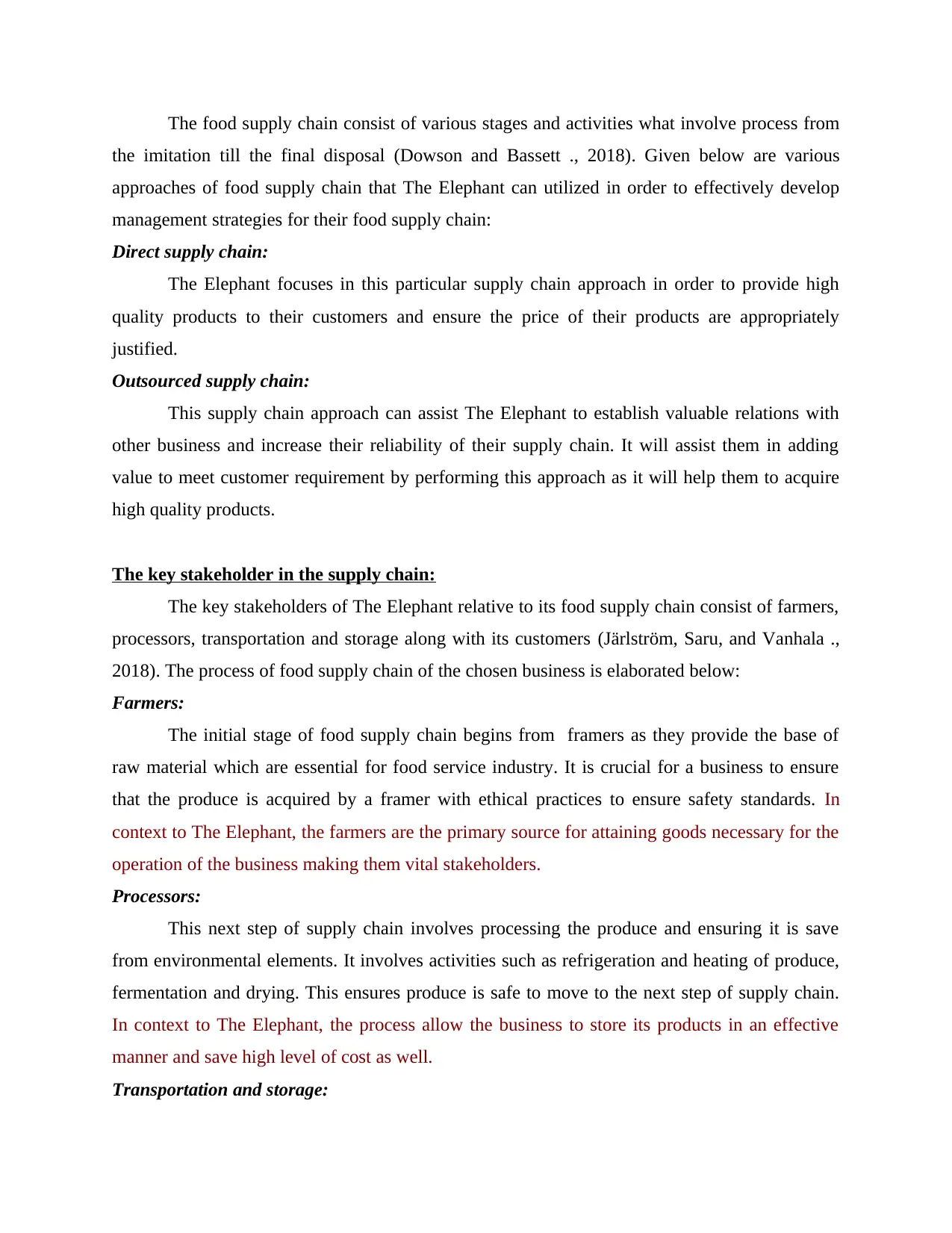
The food supply chain consist of various stages and activities what involve process from
the imitation till the final disposal (Dowson and Bassett ., 2018). Given below are various
approaches of food supply chain that The Elephant can utilized in order to effectively develop
management strategies for their food supply chain:
Direct supply chain:
The Elephant focuses in this particular supply chain approach in order to provide high
quality products to their customers and ensure the price of their products are appropriately
justified.
Outsourced supply chain:
This supply chain approach can assist The Elephant to establish valuable relations with
other business and increase their reliability of their supply chain. It will assist them in adding
value to meet customer requirement by performing this approach as it will help them to acquire
high quality products.
The key stakeholder in the supply chain:
The key stakeholders of The Elephant relative to its food supply chain consist of farmers,
processors, transportation and storage along with its customers (Järlström, Saru, and Vanhala .,
2018). The process of food supply chain of the chosen business is elaborated below:
Farmers:
The initial stage of food supply chain begins from framers as they provide the base of
raw material which are essential for food service industry. It is crucial for a business to ensure
that the produce is acquired by a framer with ethical practices to ensure safety standards. In
context to The Elephant, the farmers are the primary source for attaining goods necessary for the
operation of the business making them vital stakeholders.
Processors:
This next step of supply chain involves processing the produce and ensuring it is save
from environmental elements. It involves activities such as refrigeration and heating of produce,
fermentation and drying. This ensures produce is safe to move to the next step of supply chain.
In context to The Elephant, the process allow the business to store its products in an effective
manner and save high level of cost as well.
Transportation and storage:
the imitation till the final disposal (Dowson and Bassett ., 2018). Given below are various
approaches of food supply chain that The Elephant can utilized in order to effectively develop
management strategies for their food supply chain:
Direct supply chain:
The Elephant focuses in this particular supply chain approach in order to provide high
quality products to their customers and ensure the price of their products are appropriately
justified.
Outsourced supply chain:
This supply chain approach can assist The Elephant to establish valuable relations with
other business and increase their reliability of their supply chain. It will assist them in adding
value to meet customer requirement by performing this approach as it will help them to acquire
high quality products.
The key stakeholder in the supply chain:
The key stakeholders of The Elephant relative to its food supply chain consist of farmers,
processors, transportation and storage along with its customers (Järlström, Saru, and Vanhala .,
2018). The process of food supply chain of the chosen business is elaborated below:
Farmers:
The initial stage of food supply chain begins from framers as they provide the base of
raw material which are essential for food service industry. It is crucial for a business to ensure
that the produce is acquired by a framer with ethical practices to ensure safety standards. In
context to The Elephant, the farmers are the primary source for attaining goods necessary for the
operation of the business making them vital stakeholders.
Processors:
This next step of supply chain involves processing the produce and ensuring it is save
from environmental elements. It involves activities such as refrigeration and heating of produce,
fermentation and drying. This ensures produce is safe to move to the next step of supply chain.
In context to The Elephant, the process allow the business to store its products in an effective
manner and save high level of cost as well.
Transportation and storage:
Paraphrase This Document
Need a fresh take? Get an instant paraphrase of this document with our AI Paraphraser
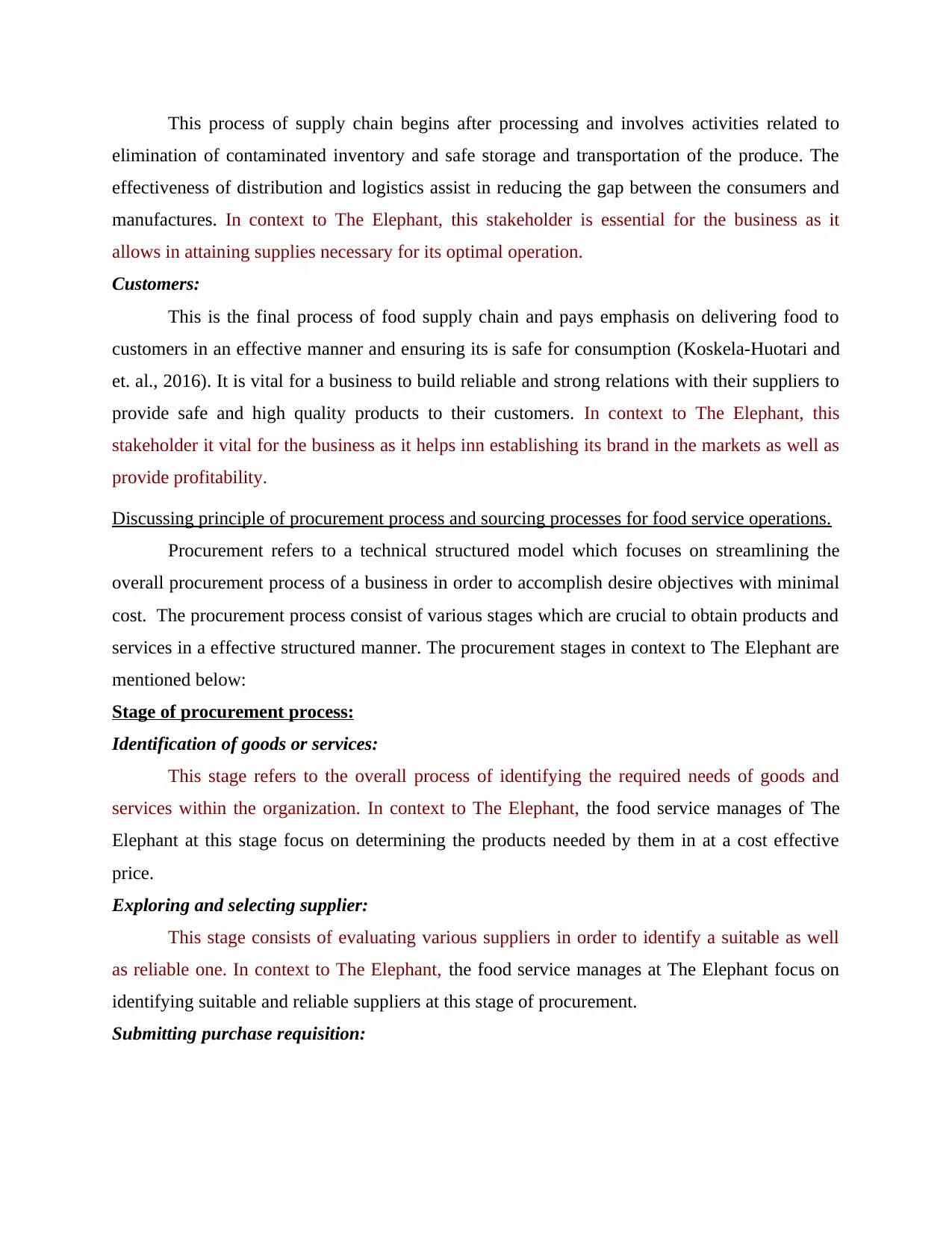
This process of supply chain begins after processing and involves activities related to
elimination of contaminated inventory and safe storage and transportation of the produce. The
effectiveness of distribution and logistics assist in reducing the gap between the consumers and
manufactures. In context to The Elephant, this stakeholder is essential for the business as it
allows in attaining supplies necessary for its optimal operation.
Customers:
This is the final process of food supply chain and pays emphasis on delivering food to
customers in an effective manner and ensuring its is safe for consumption (Koskela-Huotari and
et. al., 2016). It is vital for a business to build reliable and strong relations with their suppliers to
provide safe and high quality products to their customers. In context to The Elephant, this
stakeholder it vital for the business as it helps inn establishing its brand in the markets as well as
provide profitability.
Discussing principle of procurement process and sourcing processes for food service operations.
Procurement refers to a technical structured model which focuses on streamlining the
overall procurement process of a business in order to accomplish desire objectives with minimal
cost. The procurement process consist of various stages which are crucial to obtain products and
services in a effective structured manner. The procurement stages in context to The Elephant are
mentioned below:
Stage of procurement process:
Identification of goods or services:
This stage refers to the overall process of identifying the required needs of goods and
services within the organization. In context to The Elephant, the food service manages of The
Elephant at this stage focus on determining the products needed by them in at a cost effective
price.
Exploring and selecting supplier:
This stage consists of evaluating various suppliers in order to identify a suitable as well
as reliable one. In context to The Elephant, the food service manages at The Elephant focus on
identifying suitable and reliable suppliers at this stage of procurement.
Submitting purchase requisition:
elimination of contaminated inventory and safe storage and transportation of the produce. The
effectiveness of distribution and logistics assist in reducing the gap between the consumers and
manufactures. In context to The Elephant, this stakeholder is essential for the business as it
allows in attaining supplies necessary for its optimal operation.
Customers:
This is the final process of food supply chain and pays emphasis on delivering food to
customers in an effective manner and ensuring its is safe for consumption (Koskela-Huotari and
et. al., 2016). It is vital for a business to build reliable and strong relations with their suppliers to
provide safe and high quality products to their customers. In context to The Elephant, this
stakeholder it vital for the business as it helps inn establishing its brand in the markets as well as
provide profitability.
Discussing principle of procurement process and sourcing processes for food service operations.
Procurement refers to a technical structured model which focuses on streamlining the
overall procurement process of a business in order to accomplish desire objectives with minimal
cost. The procurement process consist of various stages which are crucial to obtain products and
services in a effective structured manner. The procurement stages in context to The Elephant are
mentioned below:
Stage of procurement process:
Identification of goods or services:
This stage refers to the overall process of identifying the required needs of goods and
services within the organization. In context to The Elephant, the food service manages of The
Elephant at this stage focus on determining the products needed by them in at a cost effective
price.
Exploring and selecting supplier:
This stage consists of evaluating various suppliers in order to identify a suitable as well
as reliable one. In context to The Elephant, the food service manages at The Elephant focus on
identifying suitable and reliable suppliers at this stage of procurement.
Submitting purchase requisition:
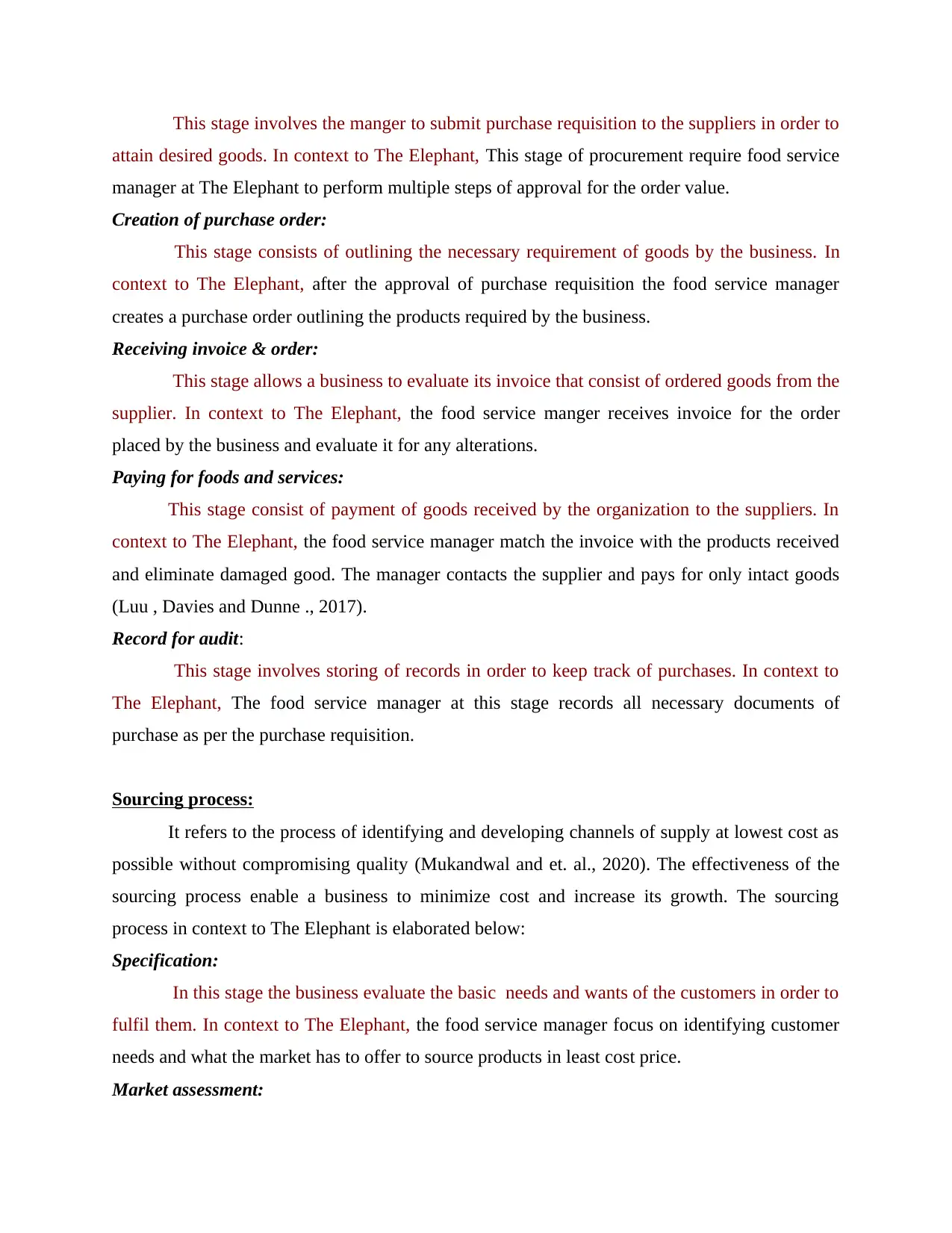
This stage involves the manger to submit purchase requisition to the suppliers in order to
attain desired goods. In context to The Elephant, This stage of procurement require food service
manager at The Elephant to perform multiple steps of approval for the order value.
Creation of purchase order:
This stage consists of outlining the necessary requirement of goods by the business. In
context to The Elephant, after the approval of purchase requisition the food service manager
creates a purchase order outlining the products required by the business.
Receiving invoice & order:
This stage allows a business to evaluate its invoice that consist of ordered goods from the
supplier. In context to The Elephant, the food service manger receives invoice for the order
placed by the business and evaluate it for any alterations.
Paying for foods and services:
This stage consist of payment of goods received by the organization to the suppliers. In
context to The Elephant, the food service manager match the invoice with the products received
and eliminate damaged good. The manager contacts the supplier and pays for only intact goods
(Luu , Davies and Dunne ., 2017).
Record for audit:
This stage involves storing of records in order to keep track of purchases. In context to
The Elephant, The food service manager at this stage records all necessary documents of
purchase as per the purchase requisition.
Sourcing process:
It refers to the process of identifying and developing channels of supply at lowest cost as
possible without compromising quality (Mukandwal and et. al., 2020). The effectiveness of the
sourcing process enable a business to minimize cost and increase its growth. The sourcing
process in context to The Elephant is elaborated below:
Specification:
In this stage the business evaluate the basic needs and wants of the customers in order to
fulfil them. In context to The Elephant, the food service manager focus on identifying customer
needs and what the market has to offer to source products in least cost price.
Market assessment:
attain desired goods. In context to The Elephant, This stage of procurement require food service
manager at The Elephant to perform multiple steps of approval for the order value.
Creation of purchase order:
This stage consists of outlining the necessary requirement of goods by the business. In
context to The Elephant, after the approval of purchase requisition the food service manager
creates a purchase order outlining the products required by the business.
Receiving invoice & order:
This stage allows a business to evaluate its invoice that consist of ordered goods from the
supplier. In context to The Elephant, the food service manger receives invoice for the order
placed by the business and evaluate it for any alterations.
Paying for foods and services:
This stage consist of payment of goods received by the organization to the suppliers. In
context to The Elephant, the food service manager match the invoice with the products received
and eliminate damaged good. The manager contacts the supplier and pays for only intact goods
(Luu , Davies and Dunne ., 2017).
Record for audit:
This stage involves storing of records in order to keep track of purchases. In context to
The Elephant, The food service manager at this stage records all necessary documents of
purchase as per the purchase requisition.
Sourcing process:
It refers to the process of identifying and developing channels of supply at lowest cost as
possible without compromising quality (Mukandwal and et. al., 2020). The effectiveness of the
sourcing process enable a business to minimize cost and increase its growth. The sourcing
process in context to The Elephant is elaborated below:
Specification:
In this stage the business evaluate the basic needs and wants of the customers in order to
fulfil them. In context to The Elephant, the food service manager focus on identifying customer
needs and what the market has to offer to source products in least cost price.
Market assessment:
⊘ This is a preview!⊘
Do you want full access?
Subscribe today to unlock all pages.

Trusted by 1+ million students worldwide
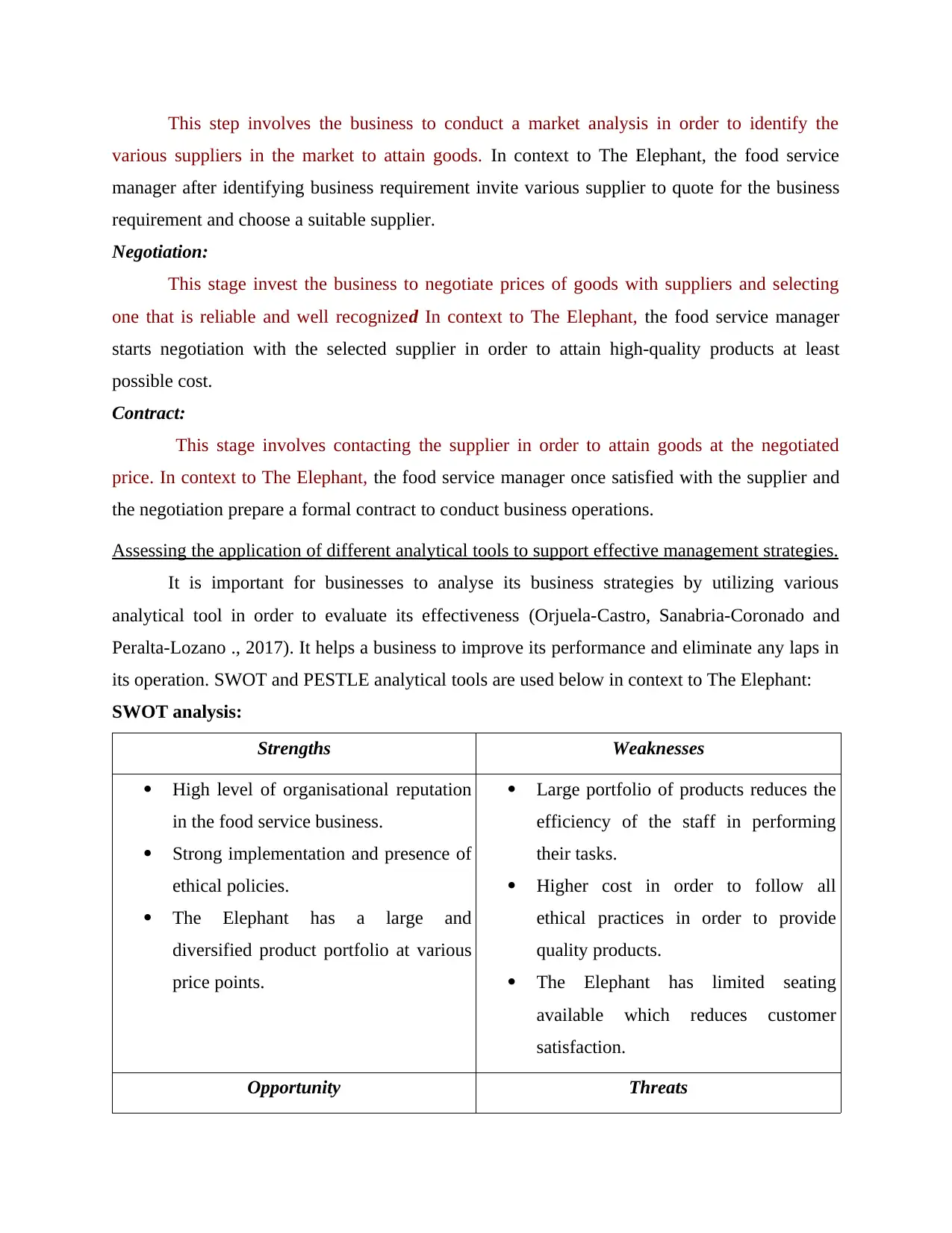
This step involves the business to conduct a market analysis in order to identify the
various suppliers in the market to attain goods. In context to The Elephant, the food service
manager after identifying business requirement invite various supplier to quote for the business
requirement and choose a suitable supplier.
Negotiation:
This stage invest the business to negotiate prices of goods with suppliers and selecting
one that is reliable and well recognized In context to The Elephant, the food service manager
starts negotiation with the selected supplier in order to attain high-quality products at least
possible cost.
Contract:
This stage involves contacting the supplier in order to attain goods at the negotiated
price. In context to The Elephant, the food service manager once satisfied with the supplier and
the negotiation prepare a formal contract to conduct business operations.
Assessing the application of different analytical tools to support effective management strategies.
It is important for businesses to analyse its business strategies by utilizing various
analytical tool in order to evaluate its effectiveness (Orjuela-Castro, Sanabria-Coronado and
Peralta-Lozano ., 2017). It helps a business to improve its performance and eliminate any laps in
its operation. SWOT and PESTLE analytical tools are used below in context to The Elephant:
SWOT analysis:
Strengths Weaknesses
High level of organisational reputation
in the food service business.
Strong implementation and presence of
ethical policies.
The Elephant has a large and
diversified product portfolio at various
price points.
Large portfolio of products reduces the
efficiency of the staff in performing
their tasks.
Higher cost in order to follow all
ethical practices in order to provide
quality products.
The Elephant has limited seating
available which reduces customer
satisfaction.
Opportunity Threats
various suppliers in the market to attain goods. In context to The Elephant, the food service
manager after identifying business requirement invite various supplier to quote for the business
requirement and choose a suitable supplier.
Negotiation:
This stage invest the business to negotiate prices of goods with suppliers and selecting
one that is reliable and well recognized In context to The Elephant, the food service manager
starts negotiation with the selected supplier in order to attain high-quality products at least
possible cost.
Contract:
This stage involves contacting the supplier in order to attain goods at the negotiated
price. In context to The Elephant, the food service manager once satisfied with the supplier and
the negotiation prepare a formal contract to conduct business operations.
Assessing the application of different analytical tools to support effective management strategies.
It is important for businesses to analyse its business strategies by utilizing various
analytical tool in order to evaluate its effectiveness (Orjuela-Castro, Sanabria-Coronado and
Peralta-Lozano ., 2017). It helps a business to improve its performance and eliminate any laps in
its operation. SWOT and PESTLE analytical tools are used below in context to The Elephant:
SWOT analysis:
Strengths Weaknesses
High level of organisational reputation
in the food service business.
Strong implementation and presence of
ethical policies.
The Elephant has a large and
diversified product portfolio at various
price points.
Large portfolio of products reduces the
efficiency of the staff in performing
their tasks.
Higher cost in order to follow all
ethical practices in order to provide
quality products.
The Elephant has limited seating
available which reduces customer
satisfaction.
Opportunity Threats
Paraphrase This Document
Need a fresh take? Get an instant paraphrase of this document with our AI Paraphraser
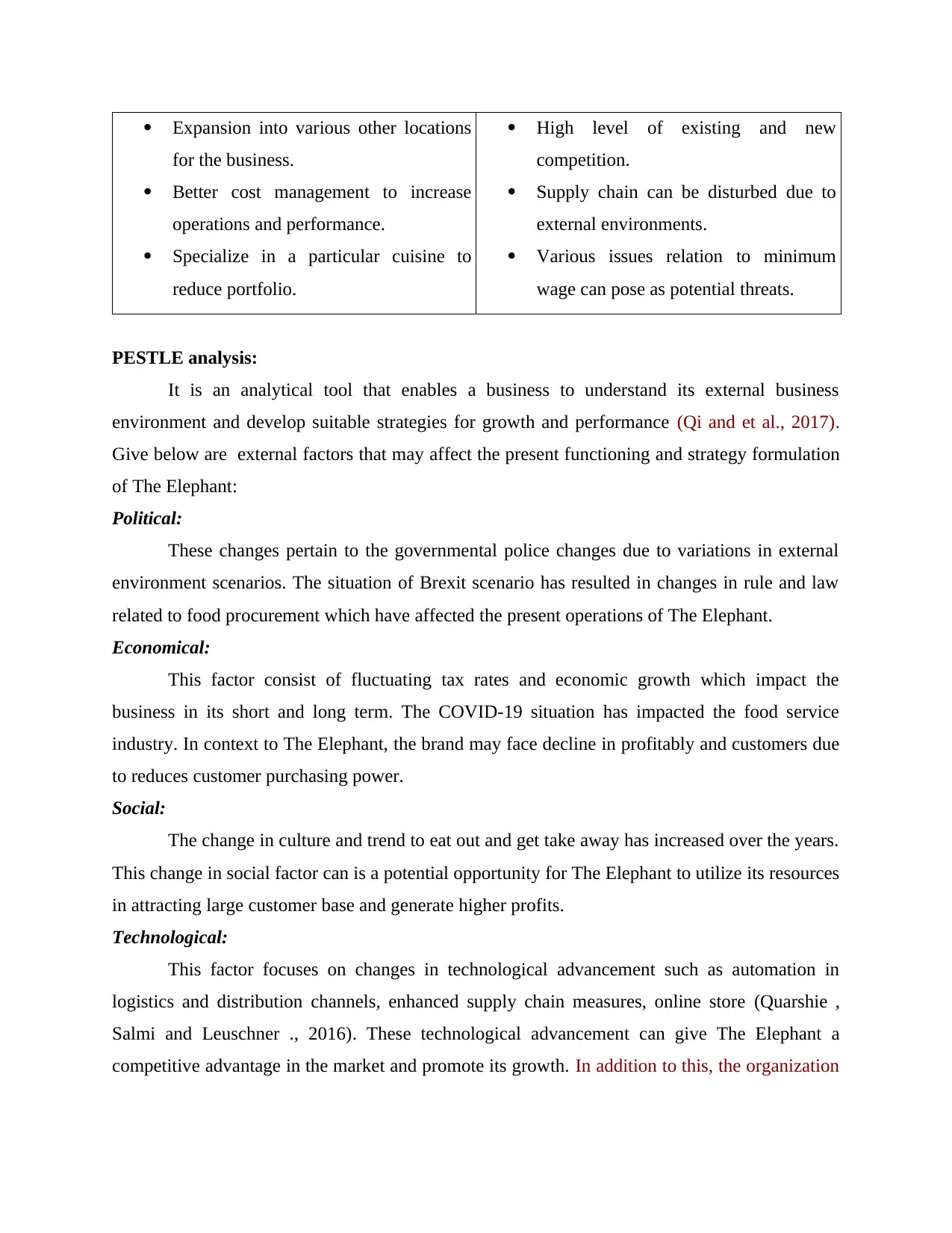
Expansion into various other locations
for the business.
Better cost management to increase
operations and performance.
Specialize in a particular cuisine to
reduce portfolio.
High level of existing and new
competition.
Supply chain can be disturbed due to
external environments.
Various issues relation to minimum
wage can pose as potential threats.
PESTLE analysis:
It is an analytical tool that enables a business to understand its external business
environment and develop suitable strategies for growth and performance (Qi and et al., 2017).
Give below are external factors that may affect the present functioning and strategy formulation
of The Elephant:
Political:
These changes pertain to the governmental police changes due to variations in external
environment scenarios. The situation of Brexit scenario has resulted in changes in rule and law
related to food procurement which have affected the present operations of The Elephant.
Economical:
This factor consist of fluctuating tax rates and economic growth which impact the
business in its short and long term. The COVID-19 situation has impacted the food service
industry. In context to The Elephant, the brand may face decline in profitably and customers due
to reduces customer purchasing power.
Social:
The change in culture and trend to eat out and get take away has increased over the years.
This change in social factor can is a potential opportunity for The Elephant to utilize its resources
in attracting large customer base and generate higher profits.
Technological:
This factor focuses on changes in technological advancement such as automation in
logistics and distribution channels, enhanced supply chain measures, online store (Quarshie ,
Salmi and Leuschner ., 2016). These technological advancement can give The Elephant a
competitive advantage in the market and promote its growth. In addition to this, the organization
for the business.
Better cost management to increase
operations and performance.
Specialize in a particular cuisine to
reduce portfolio.
High level of existing and new
competition.
Supply chain can be disturbed due to
external environments.
Various issues relation to minimum
wage can pose as potential threats.
PESTLE analysis:
It is an analytical tool that enables a business to understand its external business
environment and develop suitable strategies for growth and performance (Qi and et al., 2017).
Give below are external factors that may affect the present functioning and strategy formulation
of The Elephant:
Political:
These changes pertain to the governmental police changes due to variations in external
environment scenarios. The situation of Brexit scenario has resulted in changes in rule and law
related to food procurement which have affected the present operations of The Elephant.
Economical:
This factor consist of fluctuating tax rates and economic growth which impact the
business in its short and long term. The COVID-19 situation has impacted the food service
industry. In context to The Elephant, the brand may face decline in profitably and customers due
to reduces customer purchasing power.
Social:
The change in culture and trend to eat out and get take away has increased over the years.
This change in social factor can is a potential opportunity for The Elephant to utilize its resources
in attracting large customer base and generate higher profits.
Technological:
This factor focuses on changes in technological advancement such as automation in
logistics and distribution channels, enhanced supply chain measures, online store (Quarshie ,
Salmi and Leuschner ., 2016). These technological advancement can give The Elephant a
competitive advantage in the market and promote its growth. In addition to this, the organization
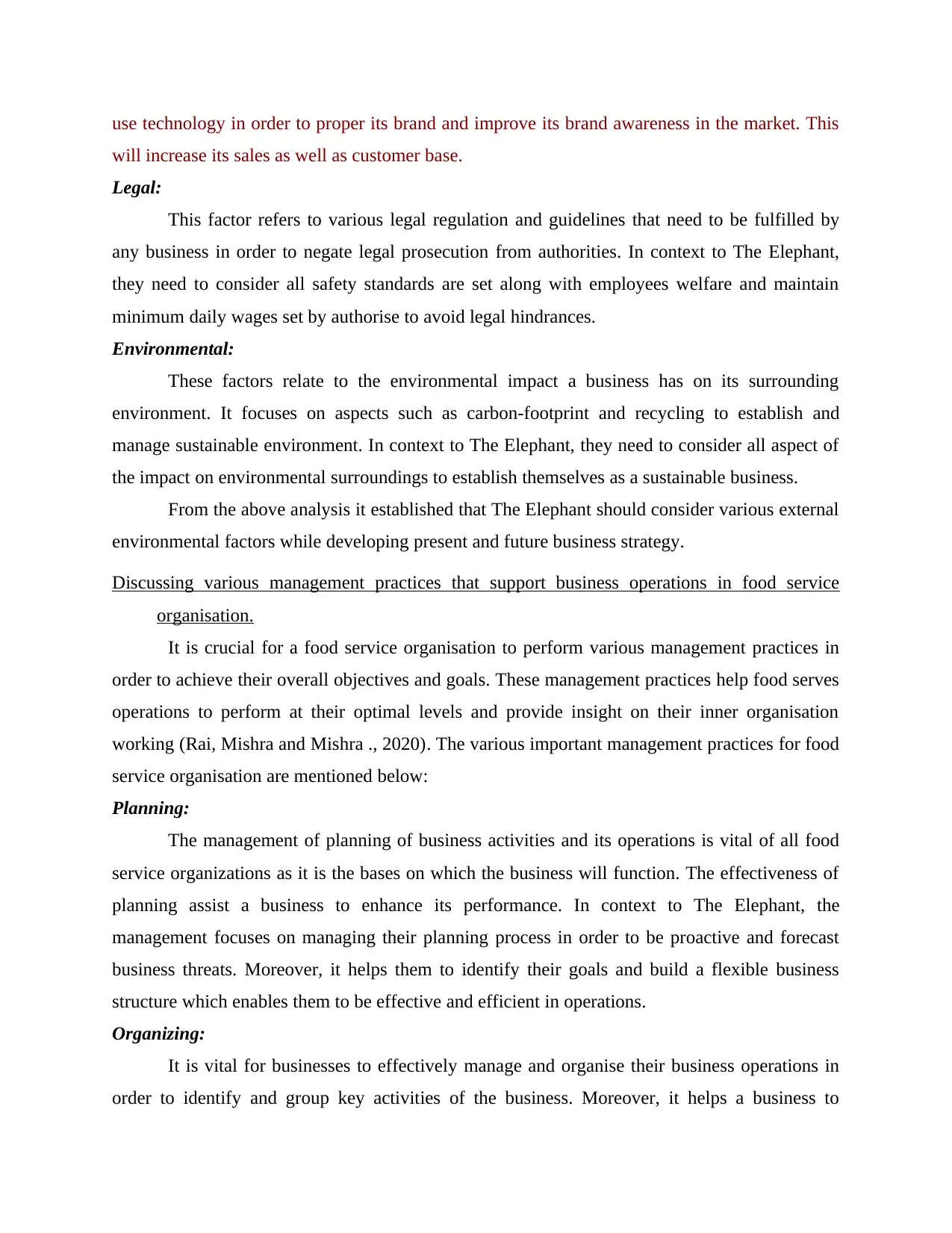
use technology in order to proper its brand and improve its brand awareness in the market. This
will increase its sales as well as customer base.
Legal:
This factor refers to various legal regulation and guidelines that need to be fulfilled by
any business in order to negate legal prosecution from authorities. In context to The Elephant,
they need to consider all safety standards are set along with employees welfare and maintain
minimum daily wages set by authorise to avoid legal hindrances.
Environmental:
These factors relate to the environmental impact a business has on its surrounding
environment. It focuses on aspects such as carbon-footprint and recycling to establish and
manage sustainable environment. In context to The Elephant, they need to consider all aspect of
the impact on environmental surroundings to establish themselves as a sustainable business.
From the above analysis it established that The Elephant should consider various external
environmental factors while developing present and future business strategy.
Discussing various management practices that support business operations in food service
organisation.
It is crucial for a food service organisation to perform various management practices in
order to achieve their overall objectives and goals. These management practices help food serves
operations to perform at their optimal levels and provide insight on their inner organisation
working (Rai, Mishra and Mishra ., 2020). The various important management practices for food
service organisation are mentioned below:
Planning:
The management of planning of business activities and its operations is vital of all food
service organizations as it is the bases on which the business will function. The effectiveness of
planning assist a business to enhance its performance. In context to The Elephant, the
management focuses on managing their planning process in order to be proactive and forecast
business threats. Moreover, it helps them to identify their goals and build a flexible business
structure which enables them to be effective and efficient in operations.
Organizing:
It is vital for businesses to effectively manage and organise their business operations in
order to identify and group key activities of the business. Moreover, it helps a business to
will increase its sales as well as customer base.
Legal:
This factor refers to various legal regulation and guidelines that need to be fulfilled by
any business in order to negate legal prosecution from authorities. In context to The Elephant,
they need to consider all safety standards are set along with employees welfare and maintain
minimum daily wages set by authorise to avoid legal hindrances.
Environmental:
These factors relate to the environmental impact a business has on its surrounding
environment. It focuses on aspects such as carbon-footprint and recycling to establish and
manage sustainable environment. In context to The Elephant, they need to consider all aspect of
the impact on environmental surroundings to establish themselves as a sustainable business.
From the above analysis it established that The Elephant should consider various external
environmental factors while developing present and future business strategy.
Discussing various management practices that support business operations in food service
organisation.
It is crucial for a food service organisation to perform various management practices in
order to achieve their overall objectives and goals. These management practices help food serves
operations to perform at their optimal levels and provide insight on their inner organisation
working (Rai, Mishra and Mishra ., 2020). The various important management practices for food
service organisation are mentioned below:
Planning:
The management of planning of business activities and its operations is vital of all food
service organizations as it is the bases on which the business will function. The effectiveness of
planning assist a business to enhance its performance. In context to The Elephant, the
management focuses on managing their planning process in order to be proactive and forecast
business threats. Moreover, it helps them to identify their goals and build a flexible business
structure which enables them to be effective and efficient in operations.
Organizing:
It is vital for businesses to effectively manage and organise their business operations in
order to identify and group key activities of the business. Moreover, it helps a business to
⊘ This is a preview!⊘
Do you want full access?
Subscribe today to unlock all pages.

Trusted by 1+ million students worldwide
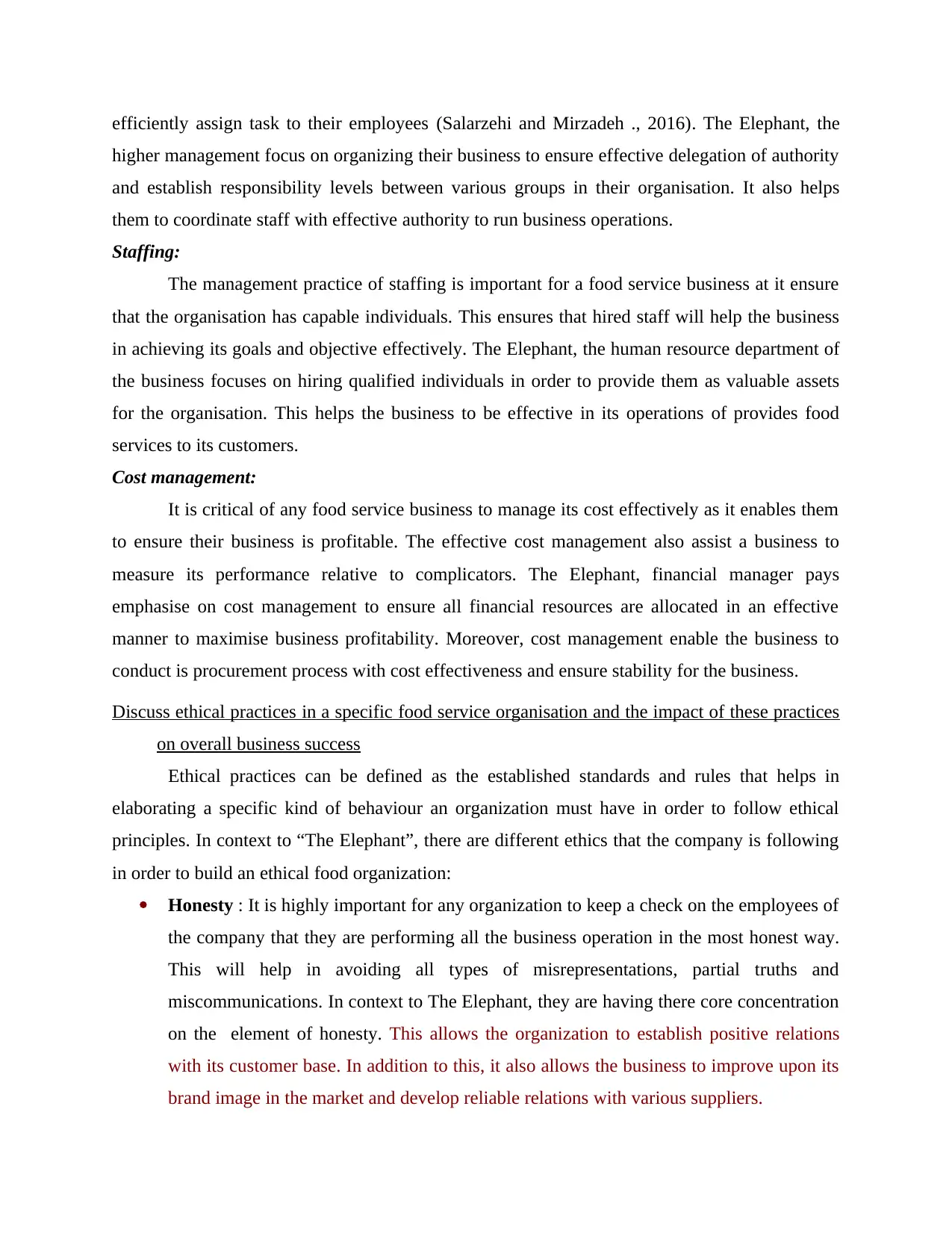
efficiently assign task to their employees (Salarzehi and Mirzadeh ., 2016). The Elephant, the
higher management focus on organizing their business to ensure effective delegation of authority
and establish responsibility levels between various groups in their organisation. It also helps
them to coordinate staff with effective authority to run business operations.
Staffing:
The management practice of staffing is important for a food service business at it ensure
that the organisation has capable individuals. This ensures that hired staff will help the business
in achieving its goals and objective effectively. The Elephant, the human resource department of
the business focuses on hiring qualified individuals in order to provide them as valuable assets
for the organisation. This helps the business to be effective in its operations of provides food
services to its customers.
Cost management:
It is critical of any food service business to manage its cost effectively as it enables them
to ensure their business is profitable. The effective cost management also assist a business to
measure its performance relative to complicators. The Elephant, financial manager pays
emphasise on cost management to ensure all financial resources are allocated in an effective
manner to maximise business profitability. Moreover, cost management enable the business to
conduct is procurement process with cost effectiveness and ensure stability for the business.
Discuss ethical practices in a specific food service organisation and the impact of these practices
on overall business success
Ethical practices can be defined as the established standards and rules that helps in
elaborating a specific kind of behaviour an organization must have in order to follow ethical
principles. In context to “The Elephant”, there are different ethics that the company is following
in order to build an ethical food organization:
Honesty : It is highly important for any organization to keep a check on the employees of
the company that they are performing all the business operation in the most honest way.
This will help in avoiding all types of misrepresentations, partial truths and
miscommunications. In context to The Elephant, they are having there core concentration
on the element of honesty. This allows the organization to establish positive relations
with its customer base. In addition to this, it also allows the business to improve upon its
brand image in the market and develop reliable relations with various suppliers.
higher management focus on organizing their business to ensure effective delegation of authority
and establish responsibility levels between various groups in their organisation. It also helps
them to coordinate staff with effective authority to run business operations.
Staffing:
The management practice of staffing is important for a food service business at it ensure
that the organisation has capable individuals. This ensures that hired staff will help the business
in achieving its goals and objective effectively. The Elephant, the human resource department of
the business focuses on hiring qualified individuals in order to provide them as valuable assets
for the organisation. This helps the business to be effective in its operations of provides food
services to its customers.
Cost management:
It is critical of any food service business to manage its cost effectively as it enables them
to ensure their business is profitable. The effective cost management also assist a business to
measure its performance relative to complicators. The Elephant, financial manager pays
emphasise on cost management to ensure all financial resources are allocated in an effective
manner to maximise business profitability. Moreover, cost management enable the business to
conduct is procurement process with cost effectiveness and ensure stability for the business.
Discuss ethical practices in a specific food service organisation and the impact of these practices
on overall business success
Ethical practices can be defined as the established standards and rules that helps in
elaborating a specific kind of behaviour an organization must have in order to follow ethical
principles. In context to “The Elephant”, there are different ethics that the company is following
in order to build an ethical food organization:
Honesty : It is highly important for any organization to keep a check on the employees of
the company that they are performing all the business operation in the most honest way.
This will help in avoiding all types of misrepresentations, partial truths and
miscommunications. In context to The Elephant, they are having there core concentration
on the element of honesty. This allows the organization to establish positive relations
with its customer base. In addition to this, it also allows the business to improve upon its
brand image in the market and develop reliable relations with various suppliers.
Paraphrase This Document
Need a fresh take? Get an instant paraphrase of this document with our AI Paraphraser
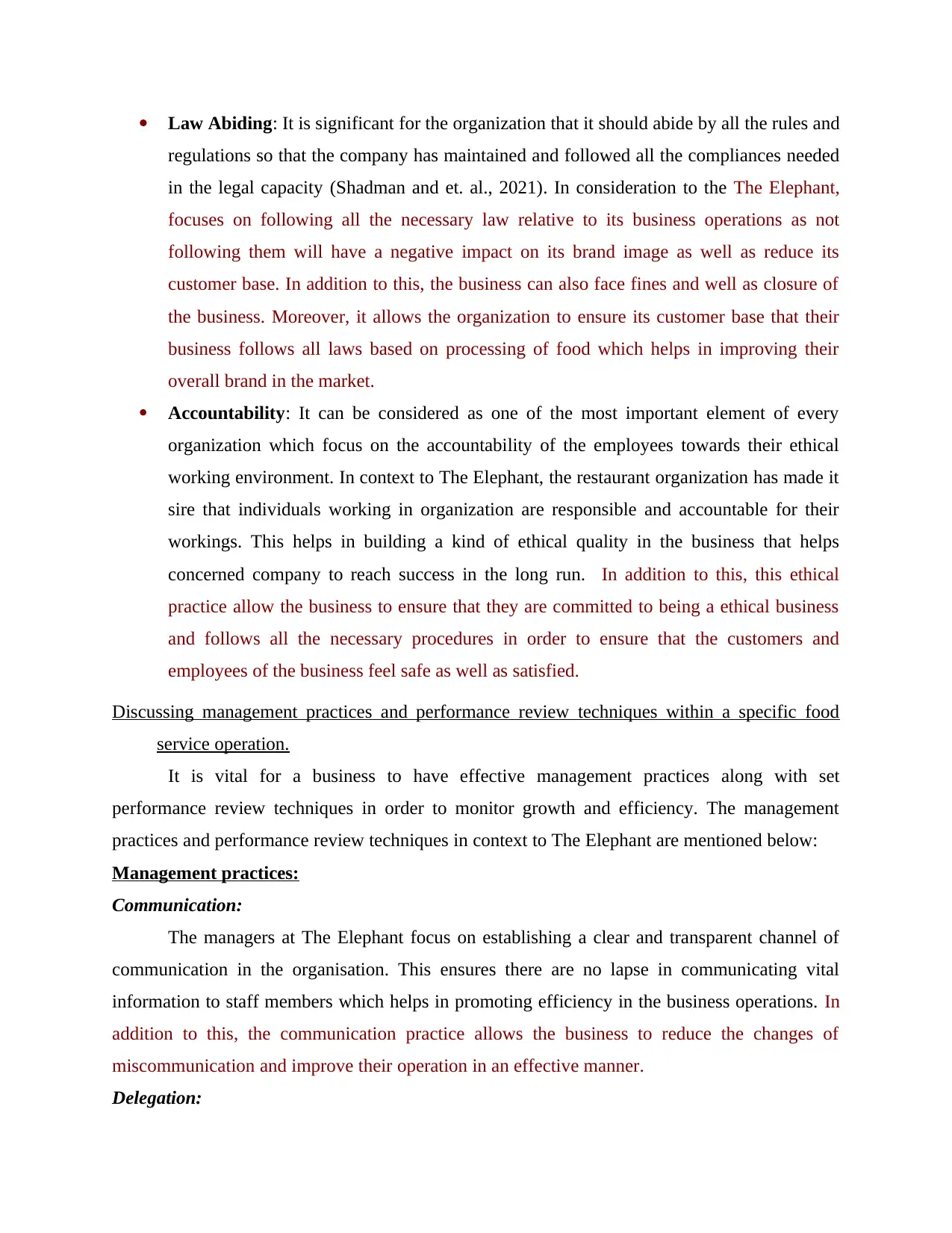
Law Abiding: It is significant for the organization that it should abide by all the rules and
regulations so that the company has maintained and followed all the compliances needed
in the legal capacity (Shadman and et. al., 2021). In consideration to the The Elephant,
focuses on following all the necessary law relative to its business operations as not
following them will have a negative impact on its brand image as well as reduce its
customer base. In addition to this, the business can also face fines and well as closure of
the business. Moreover, it allows the organization to ensure its customer base that their
business follows all laws based on processing of food which helps in improving their
overall brand in the market.
Accountability: It can be considered as one of the most important element of every
organization which focus on the accountability of the employees towards their ethical
working environment. In context to The Elephant, the restaurant organization has made it
sire that individuals working in organization are responsible and accountable for their
workings. This helps in building a kind of ethical quality in the business that helps
concerned company to reach success in the long run. In addition to this, this ethical
practice allow the business to ensure that they are committed to being a ethical business
and follows all the necessary procedures in order to ensure that the customers and
employees of the business feel safe as well as satisfied.
Discussing management practices and performance review techniques within a specific food
service operation.
It is vital for a business to have effective management practices along with set
performance review techniques in order to monitor growth and efficiency. The management
practices and performance review techniques in context to The Elephant are mentioned below:
Management practices:
Communication:
The managers at The Elephant focus on establishing a clear and transparent channel of
communication in the organisation. This ensures there are no lapse in communicating vital
information to staff members which helps in promoting efficiency in the business operations. In
addition to this, the communication practice allows the business to reduce the changes of
miscommunication and improve their operation in an effective manner.
Delegation:
regulations so that the company has maintained and followed all the compliances needed
in the legal capacity (Shadman and et. al., 2021). In consideration to the The Elephant,
focuses on following all the necessary law relative to its business operations as not
following them will have a negative impact on its brand image as well as reduce its
customer base. In addition to this, the business can also face fines and well as closure of
the business. Moreover, it allows the organization to ensure its customer base that their
business follows all laws based on processing of food which helps in improving their
overall brand in the market.
Accountability: It can be considered as one of the most important element of every
organization which focus on the accountability of the employees towards their ethical
working environment. In context to The Elephant, the restaurant organization has made it
sire that individuals working in organization are responsible and accountable for their
workings. This helps in building a kind of ethical quality in the business that helps
concerned company to reach success in the long run. In addition to this, this ethical
practice allow the business to ensure that they are committed to being a ethical business
and follows all the necessary procedures in order to ensure that the customers and
employees of the business feel safe as well as satisfied.
Discussing management practices and performance review techniques within a specific food
service operation.
It is vital for a business to have effective management practices along with set
performance review techniques in order to monitor growth and efficiency. The management
practices and performance review techniques in context to The Elephant are mentioned below:
Management practices:
Communication:
The managers at The Elephant focus on establishing a clear and transparent channel of
communication in the organisation. This ensures there are no lapse in communicating vital
information to staff members which helps in promoting efficiency in the business operations. In
addition to this, the communication practice allows the business to reduce the changes of
miscommunication and improve their operation in an effective manner.
Delegation:
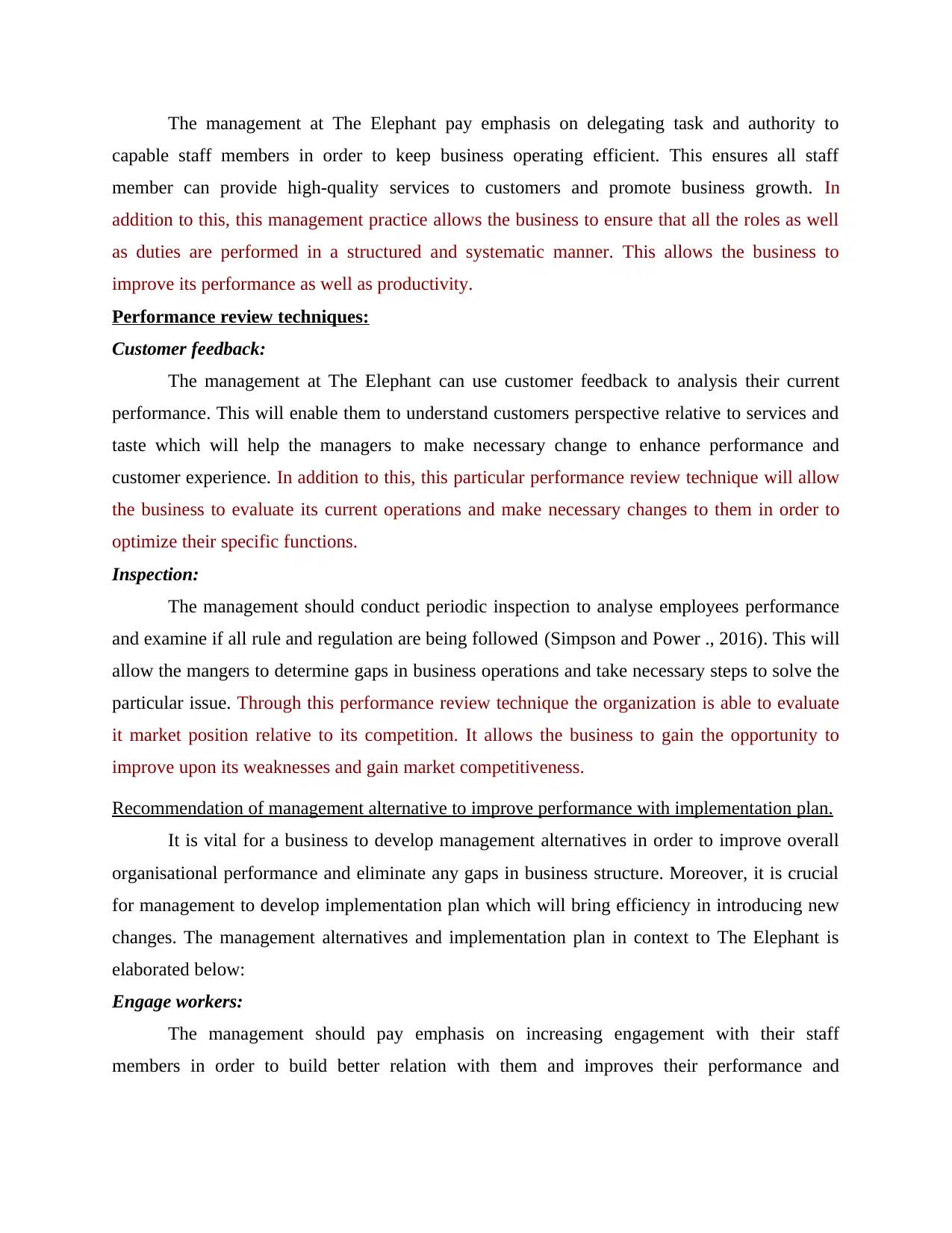
The management at The Elephant pay emphasis on delegating task and authority to
capable staff members in order to keep business operating efficient. This ensures all staff
member can provide high-quality services to customers and promote business growth. In
addition to this, this management practice allows the business to ensure that all the roles as well
as duties are performed in a structured and systematic manner. This allows the business to
improve its performance as well as productivity.
Performance review techniques:
Customer feedback:
The management at The Elephant can use customer feedback to analysis their current
performance. This will enable them to understand customers perspective relative to services and
taste which will help the managers to make necessary change to enhance performance and
customer experience. In addition to this, this particular performance review technique will allow
the business to evaluate its current operations and make necessary changes to them in order to
optimize their specific functions.
Inspection:
The management should conduct periodic inspection to analyse employees performance
and examine if all rule and regulation are being followed (Simpson and Power ., 2016). This will
allow the mangers to determine gaps in business operations and take necessary steps to solve the
particular issue. Through this performance review technique the organization is able to evaluate
it market position relative to its competition. It allows the business to gain the opportunity to
improve upon its weaknesses and gain market competitiveness.
Recommendation of management alternative to improve performance with implementation plan.
It is vital for a business to develop management alternatives in order to improve overall
organisational performance and eliminate any gaps in business structure. Moreover, it is crucial
for management to develop implementation plan which will bring efficiency in introducing new
changes. The management alternatives and implementation plan in context to The Elephant is
elaborated below:
Engage workers:
The management should pay emphasis on increasing engagement with their staff
members in order to build better relation with them and improves their performance and
capable staff members in order to keep business operating efficient. This ensures all staff
member can provide high-quality services to customers and promote business growth. In
addition to this, this management practice allows the business to ensure that all the roles as well
as duties are performed in a structured and systematic manner. This allows the business to
improve its performance as well as productivity.
Performance review techniques:
Customer feedback:
The management at The Elephant can use customer feedback to analysis their current
performance. This will enable them to understand customers perspective relative to services and
taste which will help the managers to make necessary change to enhance performance and
customer experience. In addition to this, this particular performance review technique will allow
the business to evaluate its current operations and make necessary changes to them in order to
optimize their specific functions.
Inspection:
The management should conduct periodic inspection to analyse employees performance
and examine if all rule and regulation are being followed (Simpson and Power ., 2016). This will
allow the mangers to determine gaps in business operations and take necessary steps to solve the
particular issue. Through this performance review technique the organization is able to evaluate
it market position relative to its competition. It allows the business to gain the opportunity to
improve upon its weaknesses and gain market competitiveness.
Recommendation of management alternative to improve performance with implementation plan.
It is vital for a business to develop management alternatives in order to improve overall
organisational performance and eliminate any gaps in business structure. Moreover, it is crucial
for management to develop implementation plan which will bring efficiency in introducing new
changes. The management alternatives and implementation plan in context to The Elephant is
elaborated below:
Engage workers:
The management should pay emphasis on increasing engagement with their staff
members in order to build better relation with them and improves their performance and
⊘ This is a preview!⊘
Do you want full access?
Subscribe today to unlock all pages.

Trusted by 1+ million students worldwide
1 out of 17
Related Documents
Your All-in-One AI-Powered Toolkit for Academic Success.
+13062052269
info@desklib.com
Available 24*7 on WhatsApp / Email
![[object Object]](/_next/static/media/star-bottom.7253800d.svg)
Unlock your academic potential
Copyright © 2020–2026 A2Z Services. All Rights Reserved. Developed and managed by ZUCOL.

